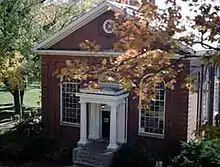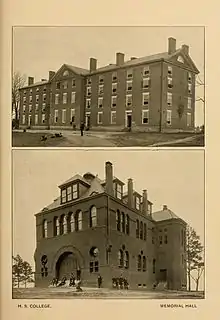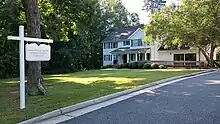Union-Philanthropic Society
The Union-Philanthropic Society, also known as the Union-Philanthropic Literary Society, is a college literary and debating society at Hampden–Sydney College in Hampden Sydney, Virginia. Founded in 1789, it is the second oldest debating society still in operation in the United States and the oldest debating society in continuous operation.[1][2][3]
Union-Philanthroic Literary Society | |
| Nickname | Phils |
|---|---|
| Formation | September 22, 1789 |
| Founded at | Hampden-Sydney College |
| Type | Collegiate debating and literary society |
| Headquarters | Hampden Sydney, Virginia |
| Location |
|
Formerly called | Union Philosophical Society Philanthropic Literary Society |


History
The Union Literary Society or Concordiæ Societas was established as a debating society at Hampden-Sydney College on September 22, 1789.[4][5] A similar group, the Philanthropic Literary Society (Phips) or Fraternitas Philanthropica, was formed in March 1805 and reestablished in 1807.[4][5] Until 1819, students were allowed to belong to both groups; this policy change and the relatively small study body at Hampdon-Sydney made the Union and Philanthropic societies rivals.[6]
By 1832, the rivalry between the two societies was "bitter".[6] Each society had its hall which was lavishly decorated, in an effort to better the other.[7] The societies also established extensive libraries of Greek and Latin authors, English classics, rare books, current fiction, and literary journals.[8] The library of the Phips surpassed that of the college by 1835.[8]
The two societies participated in inter-society debates and an annual intermediate oratory celebration, as well as holding debates amongst their members.[7][9][5] For the single society debates, two members were chosen to represent each side, with the question being determined in advance.[10] After a discussion, the members voted on the winning team.[10] These debates frequently followed current politics in Virginia, such as the ethics of slavery in 1810, the value of temperance societies in 1828, the need for freedom of the press in 1830, the emancipation of slaves and the feasibility of colonizing Liberia in 1832, and the education of African Americans in 1835.[11][1]
The two societies merged for their mutual survival to form the Union-Philanthropic Literary Society in September 1929.[12][13] Its main purpose is to advance the rhetoric skills of its members.[2] The society sponsors the Thomas Edward Crawley Tournament for high school debating teams.[14] It also sponsors panel discussion and public debates, along with informal debates at its regular meetings.[2]

Historically, the society inhabited the top floor of Winston Hall in the Patrick Henry Room.[15] Later, it met in both Cushing Hall and McIwaine Hall; the latter burned in a fire in 1957 while the society was still occupying its third floor.[16] The society raised the funds to restore Hampden-Sydney's The Birthplace (circa 1756), which the society used as a museum and meeting place from 1961 until it outgrew the space in 1992.[3][13][17] The society currently meets in Schaeffer House.
Symbols and traditions
The Union Society's badge was light blue with a silver or white emblem. The emblem featured symbols relating to the organization's history—a fasces on top of two quills, with a scroll, and a semi-circle of stars. Its motto was "Me Socium Summis Adjungere Rebus" or "I Wish to Ally Myself With the Greatest Things".[12]
The Philanthropic Society's badge was dark green with gold symbols, including an eagle with a star above and a scroll underneath, with the motto "Aude Sapere" or "Dare to Be Wise".[12]
Part of the society's furnishings includes its throne.[13]
Membership
The Union-Philanthropic Literary Society selects several students to summon for membership each term.[1] It identifies prospective members through a reception and several public meetings that are open to all students.[1] Members do not need prior experience in detabte or speech but should have an interest in learning and public discussion, as well as a friendly manner and a good character.[1]
The society also awards honorary memberships to non-students who it finds to be exemplary.[18]
See also
References
- "Clubs & Organizations". Hampden-Sydney College. Retrieved 2023-03-21.
- "Officers Elected to H-SC Literary Society". Farmville Herald. Vol. 102, no. 12. Farmville, Virginia. December 18, 1991. pp. 8A. Retrieved July 19, 2023 – via Virginia Chronicle (Library of Virginia).
- "Foundations Underwrite Historic Renovation". Farmville Herald. Vol. 110, no. 8. Farmville, Virginia. December 17, 1999. pp. 14B. Retrieved July 19, 2023 – via Virginia Chronicle (Library of Virginia).
- Hancock, J. Harrison. “Life and Thought in a Student Organization of the Old South.” The Virginia Magazine of History and Biography 47, no. 4 (1939): 315.
- "Hampden -Sydney College". Presbyterian of the South. Vol. 86, no. 9. March 14, 1917. p. 20. Retrieved July 19, 2023 – via Virginia Chronicle (Library of Virginia).
- Hancock, J. Harrison. “Life and Thought in a Student Organization of the Old South.” The Virginia Magazine of History and Biography 47, no. 4 (1939): 316.
- Hancock, J. Harrison. “Life and Thought in a Student Organization of the Old South.” The Virginia Magazine of History and Biography 47, no. 4 (1939): 317.
- J. Harrison Hancock. “Life and Thought in a Student Organization of the Old South.” The Virginia Magazine of History and Biography 47, no. 4 (1939): 320.
- "Intermediate Celebration Was Great Success". Farmville Herald. Vol. 31, no. 16. Farmville, Virginia. March 4, 1921. p. 1. Retrieved July 19, 2023 – via Virginia Chronicle (Library of Virginia).
- J. Harrison Hancock. “Life and Thought in a Student Organization of the Old South.” The Virginia Magazine of History and Biography 47, no. 4 (1939): 321.
- J. Harrison Hancock. “Life and Thought in a Student Organization of the Old South.” The Virginia Magazine of History and Biography 47, no. 4 (1939): 322-323, and 326-327.
- "UPLS History | Union-Philanthropic Society". Archived from the original on August 13, 2011. Retrieved 2023-07-19.
- Bowers, Ben (October 27, 1961). "Hampdon-Sydney's Birthplace Takes on New Lease of Life". Farmville Herald. Vol. 72, no. 9. Farmville Virginia: Virginia Heritage (Library of Virginia). pp. 4A. Retrieved July 19, 2023.
- "H-SC Debate Draws Local Participants". Farmville Herald. Farmville, Virginia. 94 (151): 13A. November 14, 1984 – via Virginia Chronicle (Library of Virginia).
- "The Patrick Henry Room | Union-Philanthropic Society". Archived from the original on August 13, 2011. Retrieved 2023-07-19.
- Hampden-Sydney Class of 1958 Memory Book. Class of 1958. April 25, 2008. p. 64.
- "Original Building at Hampden-Sydney College". Encyclopedia Virginia. Retrieved 2023-07-19.
- "Membership Information | Union-Philanthropic Society". Archived from the original on August 13, 2011. Retrieved 2023-07-19.